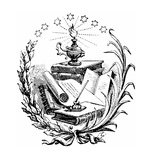
The Maturity of the Expositions of the Psalms
ST. AUGUSTINE’S CALL TO PEACE
A circle of eight grey metal folding chairs sat under the bright alphabet blocks of color dotting the walls of the elementary classroom where our Light of the World retreat group met. The focus of the retreat was to reacquaint Catholics with basic Church teachings in small settings so as to foster faith. The session was about to begin, and the chairs were about as cold as the small talk that happened to be on St. Augustine:
“He had a child!”
“Let’s see, wasn’t the quote, ‘Lord, make me celibate, but not yet’?”
“And he became a bishop! And a Doctor of the Church!”
The Confessions were all the participants knew of Augustine, so I could hardly blame them for their shortsighted understanding of him. But I had recently finished excerpting the six volumes of his Expositions of the Psalms, a work he wrote over a period of 20 years at the end of his life. After the fall of Rome, fragments were found in monasteries all over Europe. The work shaped and fostered Western Christianity as a key piece of wisdom literature. Augustine’s teachings are like the bright alphabet blocks of color in the classroom: they exist in rich, vibrant hues, offering hope for living and understanding the Christian life. But at the time, I couldn’t share any of this with the group as the session had been called to order.
The group leader, Anne, posed the preset question, “What is the role of the Holy Spirit in your life?” Everyone’s eyebrows took a dive, despite the strong spiritual life, volunteer activities, and avid interest in the retreat that all present had disclosed. Maybe Augustine was there in spirit to taunt. He knew the answer; why couldn’t we articulate it? His heart aflame in his hand remains a popular image throughout the centuries, but as much as we wanted that fire, he had it and could explain it. We were tongue-tied.
You May Also Enjoy
Fourteen American women tell how they found their way to the Church via a need for Church authority and the discovery that holiness is a journey.
A Brief History of Women in the Marines... ’Till Fortnite Do Us Part... His Knickers in a Bunch... All You Can’t Eat... Go Small or Go Home — or Both... Tyrannosaurus Towers... Algorithm as Artist... and more
The final scene of Infinity War is particularly haunting for millennials; a whole third of our generation has been destroyed by abortion.

